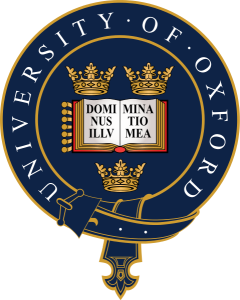University of Oxford
The University of Oxford (informally Oxford University or simply Oxford) is a collegiate research university located in Oxford, England. While having no known date of foundation, there is evidence of teaching as far back as 1096,making it the oldest university in the English-speaking world and the world’s second-oldest surviving university. It grew rapidly from 1167 when Henry II banned English students from attending the University of Paris. After disputes between students and Oxford townsfolk in 1209, some academics fled northeast to Cambridge where they established what became the University of Cambridge. The two “ancient universities” are frequently jointly referred to as “Oxbridge”.
The university is made up of a variety of institutions, including 38 constituent colleges and a full range of academic departments which are organised into four divisions. All the colleges are self-governing institutions as part of the university, each controlling its own membership and with its own internal structure and activities. Being a city university, it does not have a main campus; instead, all the buildings and facilities are scattered throughout the city centre.
Most undergraduate teaching at Oxford is organised around weekly tutorials at the self-governing colleges and halls, supported by classes, lectures and laboratory work provided by university faculties and departments. Oxford is the home of several notable scholarships, including the Clarendon Scholarship which was launched in 2001 and theRhodes Scholarship which has brought graduate students to study at the university for more than a century. The university operates the largest university press in the world and the largest academic library system in the United Kingdom. Oxford has educated many notable alumni, including 27 Nobel laureates, 26 British prime ministers (most recently David Cameron, the incumbent) and many foreign heads of state.
The University of Oxford has no known foundation date. Teaching at Oxford existed in some form in 1096, but it is unclear at what point a university came into being. It grew quickly in 1167 when English students returned from the University of Paris. The historian Gerald of Wales lectured to such scholars in 1188 and the first known foreign scholar, Emo of Friesland, arrived in 1190. The head of the university was named a chancellor from at least 1201 and the masters were recognised as a universitas or corporation in 1231. The university was granted a royal charter in 1248 during the reign of King Henry III.
After disputes between students and Oxford townsfolk in 1209, some academics fled from the violence to Cambridge, later forming the University of Cambridge.

Aerial view of Merton College’s Mob Quad, the oldest quadrangle of the university, constructed in the years from 1288 to 1378

In 1605 Oxford was still a walled city, but several colleges had been built outside the city walls (north is at the bottom on this map)
The students associated together on the basis of geographical origins, into two “nations”, representing the North (Northern or Boreales, which included the English people north of the River Trent and the Scots) and the South (Southern or Australes, which included English people south of the Trent, the Irish and the Welsh).In later centuries, geographical origins continued to influence many students’ affiliations when membership of a college or hall became customary in Oxford. In addition to this, members of many religious orders, including Dominicans, Franciscans, Carmelites and Augustinians, settled in Oxford in the mid-13th century, gained influence and maintained houses or halls for students. At about the same time, private benefactors established colleges to serve as self-contained scholarly communities. Among the earliest such founders were William of Durham, who in 1249 endowed University College,and John Balliol, father of a future King of Scots; Balliol College bears his name. Another founder, Walter de Merton, a Lord Chancellor of England and afterwards Bishop of Rochester, devised a series of regulations for college life; Merton College thereby became the model for such establishments at Oxford, as well as at the University of Cambridge. Thereafter, an increasing number of students forsook living in halls and religious houses in favour of living in colleges.
In 1333–34, an attempt by some dissatisfied Oxford scholars to found a new university at Stamford, Lincolnshire was blocked by the universities of Oxford and Cambridge petitioning King Edward III. Thereafter, until the 1820s, no new universities were allowed to be founded in England, even in London; thus, Oxford and Cambridge had a duopoly, which was unusual in western European countries.

